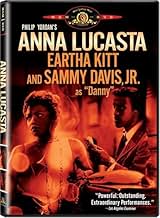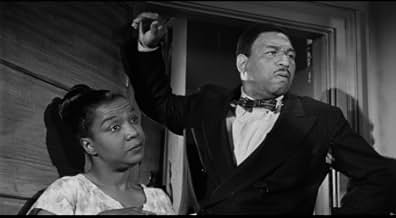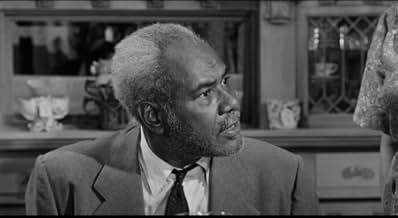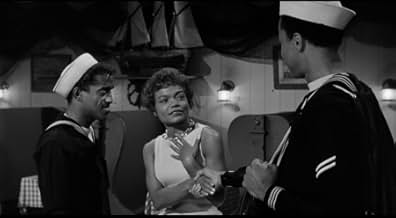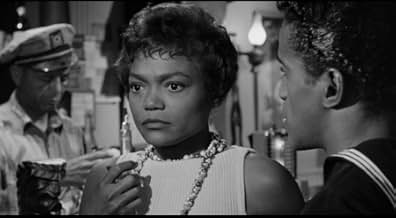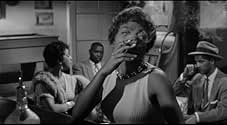A young woman struggling with a sordid past finds that her biggest enemy had larger demons than she did.A young woman struggling with a sordid past finds that her biggest enemy had larger demons than she did.A young woman struggling with a sordid past finds that her biggest enemy had larger demons than she did.
Rosetta LeNoire
- Stella
- (as Rosetta Le Noire)
Wallace Earl Laven
- Secretary
- (as Eileen Harley)
- Director
- Writer
- All cast & crew
- Production, box office & more at IMDbPro
6.8789
1
2
3
4
5
6
7
8
9
10
Featured reviews
Sammy Davis Jr and Eartha Kitt in volcanic family eruptions.
When Sammy Davis Jr and Eattha Kitt act together it's dynamite and a feast for the professional cinéaste. But they are not alone. Equally prominent is Rex Ingram as the father in a completely wayward character that can't control himself, disoriented in life, lost in booze, all mixed up because of his beloved daughter, that he felt he had to banish from his life forever, without succeeding - he is the one who begs her to come back. This is a great play enacted with grim intensity and empathy concerning all the characters, including the mother, the suitor, the family and even the lower people at the joint. An important part is played by Elmer Bernstein's music, ingeniously illustrating the rapidly changing moods and trains of thoughts, also including a fabulous show scene with Sammy going solo - this is actually the apex of the film and story, a spectacular visualization of Anna's downfall and helplessness in the hands of the totally irresponsible Danny, who loves her none the less, but like everybody else, not even he can control his love or his feelings but drifts to the storms of his caprices. In fact, Anna, the fallen woman, adored and despised by them all, is the only one with a character, while the others are hopelessly and helplessly without. But what fabulous acting by these three main characters! This is truly a film to enjoy for a theater and drama gourmet. 9,5 would be my vote.
Catwoman in a quality film, 10 years earlier
Meowwwww... Eartha Kitt, ten years before she was Catwoman on "Batman"! This film not only co-stars Sammy Davis Jr, but that's also him singing the "Anna" theme. Things are pretty rough for Anna as the film opens. She's been tossed out by her family, even to the point of not have a place to sleep. But... just as things might be turning around for her, she runs into her old sailor friend, Danny, (Sammy Davis) and his pal Lester. Anna isn't sure if she likes either one of her options... her old sailor buddy that doesn't want to get married, or the "friend of the family" that is staying in town looking for work. Rudolph is played by Henry Scott, and it looks like this film is the only thing he ever did. and just when things are finally looking up for Anna, more people are running interference against her. Based on a play by Philip Yordan. He had just won the oscar for Broken Lance. "Anna" was first done by a white cast (1949), then later done by a black cast (1958). This is quite good, and i'm glad that Turner Classics is showing it. and now that I've seen THIS version, of course i want to see the 1949 Paulette Goddard version too. Highly recommended, if you can catch it.
I Want to Be Good
This second adaptation for the big screen by Philip Yordan of his 1944 Broadway hit is more interesting for the fact of it's existence than what it actually achieves. A chance for Eartha Kitt to prove her mettle as a dramatic actress as a tart with a heart; she doesn't even sing the song that accompanies the credits - instead that falls to co-star Sammy Davis Jr.
It strongly resembles the early Garbo vehicle 'Anna Christie' (she even says "I want to go home" at one point) even down unfortunately to the tinny theatricality of the piece. Too bad Kitt never played Mata Hari or Queen Christina.
Rex Ingram registers strongly as her ogre of a father; but James Edwards as usual is wasted.
It strongly resembles the early Garbo vehicle 'Anna Christie' (she even says "I want to go home" at one point) even down unfortunately to the tinny theatricality of the piece. Too bad Kitt never played Mata Hari or Queen Christina.
Rex Ingram registers strongly as her ogre of a father; but James Edwards as usual is wasted.
This was a very good movie
This movie is frequently on a basic cable channel this month but I had seen the movie years ago.It still holds up.I think Eartha Kitt captured the personality of "Anna" completely and Sammy Davis Jr. did a good job in the role of "Danny." I felt like I was watching a stage play and I was never bored.Since it was practically unheard of for an all Black cast to do a film where the characters weren't all servants,slaves or criminals ,I enjoyed the actors being like actors in most movies.Some better than others etc."Rudolph" was the weakest role,"Stella ","Kathy".and "Stanley" barely had anything to do but "Frank" was spooky since he kept smiling all the time even when he was hitting and abusing "Mr. Lucasta."The previous poster was incorrect when he said "Rudolph" was the son of evil,shifty "Frank."He was the son of "Mr.Lucasta's" very religious friend from down south who wanted the "Lucastas" to find a wife for his farmer son."Frank" was "Stella's" husband and the son-in-law in the family.I would love to have this movie on VHS or DVD.Eartha Kitt was on TV today and she is still very pretty and youthful looking.Funny since the movie was black & white you can't tell that Miss Kitt is very light-skinned as was the mother,"Kathy",and "Stanley" and another prostitute.The actress playing "Stella" years later would play "Mother Winslow" on "Family Matters." I have never seen the version with Paulette Goddard playing Anna but I would like to just to compare the two movies.
gay icon
I can see why Eartha Kitt has always been a gay icon and why her legion of gay fans - black and white - kept her working during the twilight years of her extremely long career in show business. She's campy, witty, sexy, and vulnerable...and a very funny funny girl with a very sharp tongue especially when she delivers her trademark rapid-fire one-liners in the opening barroom scene. Her grand entrance is over-the-top and her timing perfect. In a perfect world Kitt would have been right up there with Marilyn Monroe, Barbra Streisand, Elizabeth Taylor, Joan Crawford and Rita Hayworth...BUT she was BLACK...and Hollywood has had few decent leading roles for black actresses like Kitt, Dandridge, Horne...or even Halle. The black family in this movie is captured with humor and dignity by a sterling cast of black actors hungry for work other than playing maids, butlers, African natives, and southern slaves. "Anna Lucasta" is a Black Classic.
Did you know
- TriviaOriginally a play written by Philip Yordan, portraying a Polish-American family, it was rewritten by American Negro Theater Director Abram Hill and director Henry Wagstaff Gribble for an all-African American cast.
- GoofsWhen Joe dies, his head drops to the right. When shown from another angle, he is facing left.
- ConnectionsVersion of Anna Lucasta (1949)
- How long is Anna Lucasta?Powered by Alexa
Details
- Runtime
- 1h 37m(97 min)
- Color
- Aspect ratio
- 1.66 : 1
Contribute to this page
Suggest an edit or add missing content


